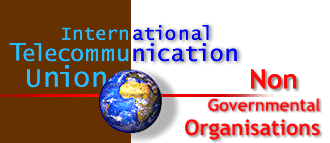
ITU-D Study Group 2 Meeting, Geneva 7th to 10th September 1999.Report on Focus Group 2 10/g , on ITU and NGOs
Outcome of the ITU-D Study Group 1 Meeting, Geneva, September 1999.
To: Platform for Cooperation on Communication and Democratisation
From: Seán Ó Siochrú, Rapporteur
The following is a summary account of the Geneva visit. Group 1
In addition to attending the Study Group Working and Plenary meetings, formal meetings were held with the following:
Numerous useful informal discussions and interactions were had with: George Dupont, UNESCO; Susanna George, Director ISIS International; Bruce Gracie, Head, Canadian Delegation; Susan Hart, Director, NetCorps, Industry Canada; Nabil Kisrawi, Syrian Delegation, President Study Group 1; Jane Roberts Coffin, US Delegation NTIA, President Question 10.
- Yoshio Atsumi, General Secretary ITU;
- H. Touré, Director ITU- Development Sector;
- Pierre Gangé, head, Policies, Strategies and Financing Department, ITU-D;
- Mr. Tony Hill, Coordinator, United Nations, Non-Government Liaison Service (NGLS).
The main points are as follows:
I presented the report to Study Group 2, using power-point, and the plenary meeting agreed that ‘this was an excellent and timely report’. Discussion continued for about 45 minutes, and at times risked breaking down into disagreement (see official minutes.) The ITU-D Director (Hamadoun Touré) was present (at the back first, then from the podium), and intervened positively several times, quipping that he was afraid that someone would suggest that ‘we form a Focus Group to look into it.’
The main outcomes were as follows:
- Our Report will be forwarded to the ITU-D Director, and he will edit and pass it to the Telecommunication Development Advisory Group (TDAG - who advise Touré), who are meeting in the middle of September. They may advise Touré to forward it to the ITU Reform Group (which deals with ITU collaboration with other entities, and covers the entire ITU), possibly then for transmission to the next Plenipotentiary. Touré’s words, to me and to the Plenary were: ‘I will take out the relevant parts, the parts that do not relate specifically only to other Sectors, and forward the report to TDAG for consideration.’ Privately to me, he claims that he will personally follow this through. Progress thus depends on his determination in this - and whether we can add urgency to his efforts. The ultimate point could be to create a new membership category and approve it at Marrakech in 2002.
- The Recommendation to Sector Members (governments) regarding developing a policy framework for NGOs needs (see Section 3.2, Rec. 2) is being forwarded to Study Group 1, which deals with regulatory matters. Whether anything happens here will depend probably on the input we are willing and able to give to this. However, recommendations concerning spectrum management and standards were judged to be outside the mandate of the ITU-D, and no further action could be taken. (I explored the possibility of passing them to the other Sectors, but my advisers felt that would hit a stone wall, and anyhow were not properly or fully formulated.)
- The Global Summit on the Information Society is currently with an ITU Task Force, who must prepare a feasibility study for the Council meeting next May or June, where the final decision will be taken on whether to proceed. Pierre Gagné, a senior ITU-D official on the Task Force is eager that NGOs should be involved in the organisation, and said we send him a note on this. (Muhammad Harbi, new Head of Strategy at General Secretariat, is chairing this group, and has promised to contact me directly he is back from holidays.) This offers the best prospects for pulling NGOs together to debate and understand the global media issues at stake.
- No direct progress was made on the Platform becoming an ITU-D member, or of gaining access to the ITU’s TIES database. I discussed with Touré a ‘partnership arrangement’ as an interim possibility, prior to the next Plenipotentiary. A ‘partnership’ is where each side offers to exchange certain things, and these have been entered in to with private sector bodies and others.

